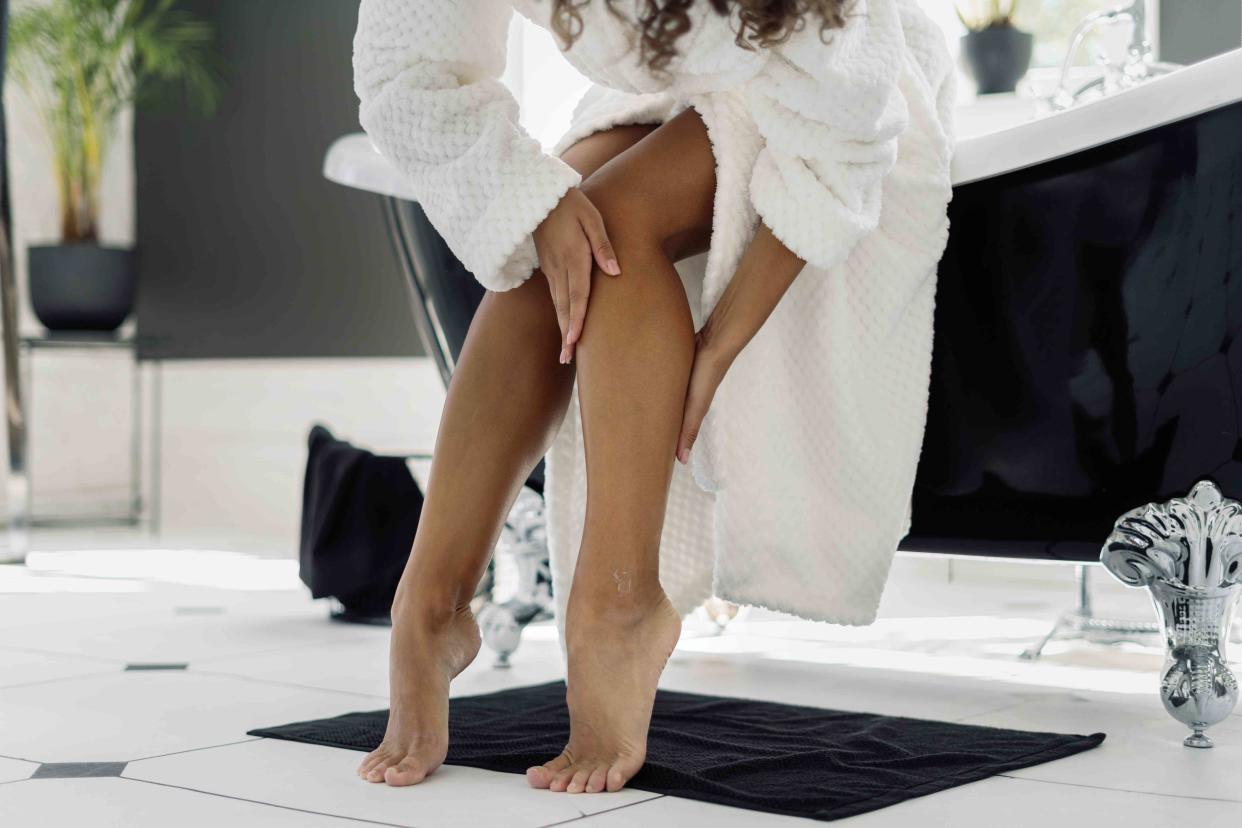Are You Supposed to Exfoliate Before or After Shaving?
We’ve got the final answer on when to exfoliate.

Brizmaker/Getty Images
Our skin constantly sheds skin cells, but as we get older the turnover rate slows down and dead skin cell buildup can occur. This results in flaky or dry-looking skin, and can also make for a lackluster appearance versus a healthy, lustrous one. Using an exfoliating product lends a helping hand to the process by sloughing off dead skin so skin can really get its glow on.
But what’s the best way to go about it? Should you exfoliate before or after shaving? And does the order of operations change depending on the type of exfoliator you use? We’ve got all the answers.
RELATED: 3 DIY Body Scrub Recipes You Can Easily Make at Home
Should You Exfoliate Before or After Shaving?
Ideally, you should exfoliate before shaving. “Without exfoliation, the razor tends to get buildup and may not remove hair as efficiently or close to the skin,” notes Maya Thosani, MD, a board-certified dermatologist based in Scottsdale, Ariz. “Exfoliation also removes the dead skin that surrounds and coats the hairs, so it can seem like it lifts the hairs up for a closer shave and a smoother result.”
She adds that since freshly exfoliated skin leads to a more even skin surface, it can also help reduce nicks and cuts. Also, some exfoliants—especially chemical exfoliators and physical scrubs made with salt—can potentially irritate freshly shaved skin. And if you’ve got a fresh cut from shaving? Ouch!
The bottom line is that no matter what kind of exfoliant you prefer, be it a superfine scrub or a product formulated with powerful acids, it’s always best to exfoliate before shaving. As for moisturizing, this is a must every time you hop out of the shower, but is particularly important post exfoliation and shaving since these two things can be drying.
5 Benefits of Exfoliating Your Body
If you’ve ever been on the fence about exfoliating your body (or you’re not so great at keeping a routine), here are some benefits that might just convince you to exfoliate on a regular basis.
Skin Looks More Youthful: “It’s important to exfoliate your body because this regulates the amount of dead skin that sits on the surface of your skin,” notes Rachel Lozina, a licensed esthetician and founder of Blue Water Spa in Oyster Bay, New york. “If you have too much dead skin sitting on the surface of your skin, it can lead to dull, dry and older, looking skin.”
Minimizes Breakouts: Those dealing with body acne can benefit from using a salicylic-based exfoliator. These help keep pores clear so you have fewer breakouts.
Smoothes Skin: Exfoliants can help buff away rough texture and bumps, resulting in a smoother and more even complexion. Dr. Thosani says they can even help minimize issues such as keratosis pilaris (also known as “chicken skin.”)
Helps Products Absorb: When there’s less buildup sitting on the surface of your skin, products applied after showering—like body serums, creams, oils, sunscreen, and sunless tanners—are more easily absorbed.
Makes Shaving Easier: Razors glide more easily over exfoliated skin. This is because dead skin cells don’t get caught in the blades, and because the skin is more smooth and even.
How Often Should You Exfoliate?
Generally speaking, aim for one to two times per week. That said, how often you exfoliate depends on the type of exfoliator you use and your skin type. “Dry skin, for instance, is skin that’s lacking oil and that skin type can be exfoliated one to two times a week without any negative side effects,” Lozina says. “Oily, thicker skin can be exfoliated every day with no negative side effects.”
Gentle Exfoliation (e.g. micro-scrubs, loofahs)
Gentle exfoliation can be as simple as using an exfoliating bar soap that has micro scrubbers or using a gentle mesh bath loofah. “These can safely be done daily as long as too much pressure is not used,” Dr. Thosani says.
Chemical Exfoliators (e.g. acids, enzymes)
Chemical-based exfoliators, like those formulated with alpha hydroxy and beta hydroxy acids (AHAs and BHAs) or enzymes, are best used once every week or two depending on the potency and your skin type. Follow the on-label instructions when in doubt, and pay attention to your skin’s reaction.
Firm Physical Exfoliation (e.g. scrubs, dry brushing)
Physical exfoliators packing a bit more gusto should be done no more than per week—especially if firm pressure is used, Dr. Thosani says. She adds, “These can cause irritation and worsen dryness if not followed up by applying an emollient cream to restore the moisture and heal the skin barrier after performed.”
For more Real Simple news, make sure to sign up for our newsletter!
Read the original article on Real Simple.
